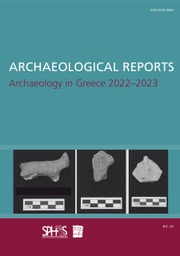No CrossRef data available.
Article contents
Cave heritage in Greece: Aetoloakarnania
Published online by Cambridge University Press: 13 February 2018
Extract
The Ephorate of Palaeoanthropology and Spelaeology (EPS) is the state-run body responsible for the range of issues revolving around the legal protection, management, development and interdisciplinary study of caves in Greece (http://www.culture.gr/el/ministry/SitePages/viewyphresia.aspx?iID=1784). It is housed in the Ministry of Culture and Sports and is the sole institution taking an integrated overview of the issues surrounding caves in Greece. Its position within the cultural-heritage domain derives from caves being fully ascribed the status of ancient monuments and thus subject to the protective provisions of the archaeological law (3028/2002), alongside and independent of their status and need for protection as sustainable natural landforms. Once caves were recognized as sites requiring specialized archaeological research with distinct administrative requirements, the Ephorate of Speleology was established as a special office within the Ministry of Culture in 1976; it was comparable in status, at a later stage, to the local ephorates of antiquities, but as an entity constituted at the national rather than the district level. Its supra-regional scope was reformulated by legislation in 2014 reuniting into one institution the two components (northern and southern Greece) into which it had been separated a decade previously.
- Type
- Archaeology in Greece 2016–2017
- Information
- Copyright
- Copyright © Authors, the Society for the Promotion of Hellenic Studies and the British School at Athens 2017




